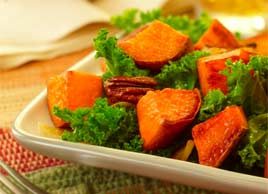4 essential foods to keep you healthy
Four versatile produce powerhouses’kale, sweet potato, spinach and strawberries’boast outstanding health benefits (and great taste) that will put you on the fast track to feeling great

Source: Web exclusive: October 2009; adapted courtesy gosouthfresh.com
Want to eat better? There’s no simpler way than by including more whole fruits and vegetables in your diet. Kale, spinach, sweet potatoes and strawberries are a good place to start’not only do they offer complementary nutritional benefits, but they work well together in recipes.
Liz Pearson, best-selling author, registered dietitian and founder of The Pearson Institute of Nutrition, explains the virtues of these four fruits and vegetables and shares tips on how on-the-go families can get the most out of these nutrient-packed foods.
1. Kale
"Kale has been called one of the world’s healthiest vegetables for good reason. Based on research from the University of Washington, it is the most nutrient dense vegetable you can eat," says Pearson. "A daily serving of kale, or other dark leafy greens, helps you meet your needs for many essential vitamins and minerals."
‘ If you’re looking for a cancer-fighting superstar, make room in your diet for cruciferous vegetables like kale. These vegetables are linked to a lower risk of the most common cancers, including breast, prostate and lung cancer. They contain plant compounds that help detoxify substances that cause cancer before they damage body cells.
‘ Kale is an exceptional source of vitamin K, a disease-fighting nutrient most people don’t get enough of. Vitamin K is especially important for the health of your bones and arteries. Kale is also rich in beta-carotene and vitamin C.
‘ Kale is good for eye health. It’s an exceptional source of lutein and zeaxanthin ‘ two nutrients linked to a lower risk of cataracts and macular degeneration ‘ the leading cause of adult blindness.
Try these recipes:
‘ Sautéed Kale
‘ Chicken, Kale and Edamame White Tea Noodle Soup
‘ Kale and Sweet Potato Soup
2. Sweet potatoes
"When it comes to fruits and vegetables, colour is a great indicator of nutritional value," says Pearson. "The deep orange flesh of a sweet potato tells you it is a goldmine of nutrition."
‘ Sweet potatoes are low in fat and contain fibre and a wide variety of vitamins and minerals. In particular, they are an exceptional source of beta-carotene, an antioxidant that is important for eye health and may reduce the risk of cancer.
‘ Canada’s Food Guide recommends eating one dark green and one orange vegetable, such as sweet potatoes, each day. Orange vegetables are essential for the vitamin A (often found in the form of beta-carotene) they provide.
‘ Most people know that too much sodium from foods can increase blood pressure. What many people may not realize, is that boosting potassium intake can significantly lower blood pressure as it has the opposite effect to sodium. Potassium is also a nutrient very few people get enough of’sweet potatoes are one of the most potassium-rich foods you can eat.
‘ Unlike white potatoes, sweet potatoes have a low glycemic score. This means your blood sugar rises only about half as much after eating a sweet potato as it does when you eat a white potato. In addition to controlling your blood sugar, eating foods with a low glycemic index may help you control your appetite and reduce your risk of developing type 2 diabetes and heart disease.
Try these recipes:
‘ Warm Sweet Potato and Kale Salad
‘ Sweet Potato Salmon Cakes
‘ Roasted Apple and Sweet Potato Soup with Spiced Walnuts
3. Spinach
"Spinach is a nutritional powerhouse and disease-fighting superstar," Pearson says. "Cornell University researchers put spinach at the top of the list as the vegetable we should eat more often based on its exceptional antioxidant profile and ability to suppress cancer."
‘ Compared to iceberg lettuce, spinach contains four times more potassium, seven times more folate, 11 times more magnesium and vitamin E, and 18 times more vitamin A.
‘ Research from the USDA Human Nutrition Research Center on Aging shows that spinach has the potential to slow down or even reverse declines in cognition‘the ability to think, learn and remember’that occur with age.
Try these recipes:
‘ Millet with Spinach and Pine Nuts
‘ Tarragon Chicken with Baby Spinach
‘ Spinach Guacamole Quesadillas
4. Strawberries
"Strawberries are among the most antioxidant rich food you can eat," says Pearson. "The antioxidants they contain help prevent damage to cells that lead to disease like heart disease, cancer and Alzheimer’s. They’re also an excellent source of vitamin C’just one cup exceeds your recommended intake for the day."
‘ Harvard researchers have found that eating two servings of strawberries each week may lower your risk of heart disease or stroke by reducing compounds associated with inflammation of the blood vessel wall.
‘ In a study by the Clinical Nutrition & Risk Factor Modification Center in Toronto, strawberries were also found to help prevent oxidation of LDL cholesterol (the unhealthy or bad cholesterol in your blood)’when LDL becomes oxidized it is more likely to be deposited along arteries walls. For a healthy heart, eat strawberries.
‘ In a study from the University of California, valuable plant compounds found in strawberries called phenolics were found to inhibit oral, prostate and colon cancer cells in the lab. Researchers concluded that this work adds to the growing body of data showing that berry phenolics have a potential impact on human health.
Try these recipes:
‘ Arugula & Strawberry Salad
‘ Strawberry-Cucumber Salad with Almonds and Mint
‘ Spinach and Strawberry Smoothie
Don’t miss out! Sign up for our free weekly newsletters and get nutritious recipes, healthy weight-loss tips, easy ways to stay in shape and all the health news you need, delivered straight to your inbox.




